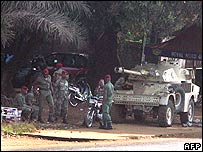Guinea leader declares emergency
Tuesday, 13 February 2007  news.bbc.co.uk
news.bbc.co.uk
|
Guinea's President Lansana Conte has declared a "state of siege" and told the army to restore public order, after three days of violent protests.
Mr Conte said he had told the military to "take all necessary measures" to prevent a civil war.
A curfew has been declared, with people only allowed to leave their homes between 1600 and 2000 local time, while there is a heavy security presence.
The clashes came during a strike called to force Mr Conte from power.
There are isolated reports of gunshots, as the army tries to enforce the curfew order but correspondents say the streets are largely deserted, except for the military patrols.
'Protect the people'
At least 15 people were reportedly killed in the capital, Conakry, on Monday.
Gunfire was heard near army barracks, while gangs of youths armed with machetes and clubs were seen marching through some suburbs.
|
President Lansana Conte |
Others were killed in clashes on Saturday, as protesters took to the streets in several Guinean towns.
The unions called off last month's 18-day strike after Mr Conte promised to hand powers to a prime minister.
But they renewed the strike action call after saying the man named on Friday for the post, Eugene Camara, was too close to Mr Conte.
Dressed in traditional robes, Mr Conte appeared on national television and radio to announce that the unrest amounted to a "state of siege".
"Orders have been given to the heads of the armed forces to take all necessary measures to re-establish public order and protect the people of Guinea from a civil war," he said.
Mr Conte said he had fulfilled the unions' demand that he appoint a prime minister, and accused "badly intentioned people" of hijacking the movement to flout government authority.
'Angry population'
The BBC's Will Ross in Conakry says that with so many people calling for the president to step down, the new measures are likely to produce even more anger among an already angry population.
Many in Guinea blame Mr Conte - who seized power in a 1984 coup but has since won three elections - for the country's ailing economy, our reporter says, and see a change of leadership as the only solution.
The president, meanwhile, has turned to the army to end the crisis, he says.
Under Guinean law, a state of emergency prohibits all public gatherings and imposes a strict curfew, while giving the military expanded powers.
The French Foreign Ministry has said it is following the situation "extremely closely" and has urged all parties to exercise restraint.
Regional fears
The unions say Mr Conte, who is in his 70s, has diabetes and rarely appears in public, is too sick to continue running the country.
They also accuse him of personally securing the release of two prominent men accused of corruption.
Guinea is rich in minerals but is seen as one of the world's most corrupt countries and most people live in poverty.
About 60 people were killed in protests during last month's strike, when security forces fired live bullets to prevent demonstrators reaching central Conakry.
Some fear that violence in Guinea could spread to its neighbours, Liberia, Ivory Coast and Sierra Leone.

 Orders have been given to the heads of the armed forces to take all necessary measures to re-establish public order
Orders have been given to the heads of the armed forces to take all necessary measures to re-establish public order 